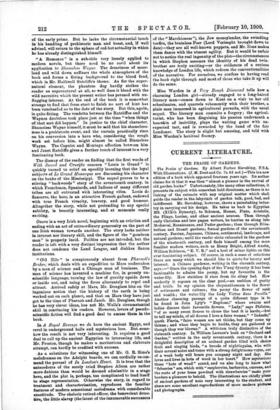CURRENT LITERAT EIRE.
THE PRAISE OF GARDENS.
The Praise of Gardens. By Albert Forbes Sieveking, F.S.A. With Illustrations. (J. M. Dent and Co. 7s. 6d net )—This is a new edition of a book which appeared fourteen years ago. Its author claims for it that it was then "almost a pioneer in the revival of old garden books." Unfortunately, like many other collections, it presents its subject with somewhat bald directness, as there is no linking of the extracts with any original matter which shall guide the reader in the labyrinth of garden talk, good, bad, and indifferent. Mr. Sieveking, however, shows a painstaking indus- try in carrying out his design. He takes us back to Egyptian MS. (XIXth Dynasty), to Solomon, Homer, Plato, Aristotle, the Plinys, Lucian, and other ancient sources. Then through early Christian and late pagan waiters, he hurries us along into Medifeval, Renaissance, and Tudor, gardens ; then through Eliza- bethan and Stuart gardens; formal gardens of the seventeenth century, Persian, Japanese, Chinese, sentimental, landscape, and natural gardens ; until the reader sinks exhausted in the gardens of the nineteenth century, and finds himself among the more familiar modern writers, such as Henry Bright, Alfred Austin, William Robinson, "E. V. B.," and a host of minor lights on this ever fascinating subject. Of course, in such a mass of selections there are many which we should like to quote for beauty and interest. A Chinese gardener, writing in the eleventh century, says :—" Since the opening days of the T'ang dynasty it has been fashionable to admire the peony, but my favourite is the water-lily. How stainless it rises from its slimy bed. How modestly it reposes on the clear pool,—an emblem of purity and truth. In my opinion the chrysanthemum is the flower of retirement and culture ; the peony the flower of rank and wealth ; the water-lily the Lady Virtue Sans &ovine." Another charming passage of a quite different type is to be found in John Lyly's " Euphues," where swains and ladies discuss their favourite flowers. "Lady," says Philetus, "of so many sweet floures to chuse the best it is harde,—but to tell my minde, of all floures I love a fake woman." " Indeede," qnoth Flavia, "faire women are set thicke, but they come up thinne ; and when they begin to budde, they are gathered as though they wer blovrne." A witticism truly distinctive of the sixteenth century. In William Lawson's book on "Orchard sad Garden," written in the early seventeenth century, there is a delightful description of an orchard garden filled with choice fruit and singing birds, "a broods of nightingales, who with their several notes and tunes with a strong delightsome voyce, out of a weak body will bears you company night and day. She loves and lives in hots of wood in her heart." How mysterious these "hots of wood" sound, and we also long to know what " feberries " are, which with "raspberries, barberries, currens, and the roots of your trees powdred with strawberries" make your borders a pleasure to behold,. The illustrations are chiefly plans of ancient gardens of note very interesting to the student, and there are some excellent reproductions of more modern pictures and photographs.


































 Previous page
Previous page